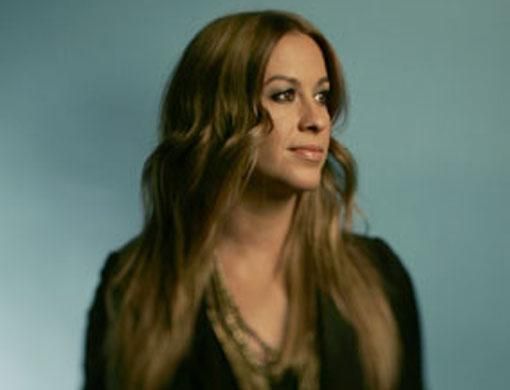Alanis Morissette has felt heartbreak before, as anyone who has listened to her ripped-from-life songs knows.
But last year's split with her fiancé, actor Ryan Reynolds, turned out to be the big one.
“I think it's the straw that breaks the camel's back,'' Morissette says. “It's having had too many of them. And I was a full-blown love addict, so it was like, ‘I can't keep doing this; my body can't take it.' Breakups are a horrible thing for almost everybody I know. For someone who is a love addict, it's debilitating.
“I've been on a constant journey towards finally surrendering and hitting the rock bottom that I've been avoiding my whole life.
"So this was a huge, critical juncture for me. Everything broke, and it was an amazing and horrifying time.''
Not surprisingly, you can hear all about it on Morissette's new album, Flavors of Entanglement.
Although it touches on other themes and isn't framed as a literal blow-by-blow account, the 11 songs describe knotty conflicts and the pain of separation.
I miss your warmth and the thought of us bringing up our kids / And the part of you that walks with your stick-tied handkerchief, she sings in Torch, dealing out vivid details in her distinctively conversational style.
But more of the songs — Not as We, Moratorium, Giggling Again for No Reason — are drawn from the prolonged aftermath of the breakup, a process leading to what she calls “the Phoenix rising''.
Limping back to normalcy
“I entered into my own version of rehab. I went to therapy five days a week. I journaled. I had a lot of support from friends. ... It was just really moment by moment, step by step, snail's pace.''
She also gutted and remodelled her Los Angeles house (one of her favourite forms of expression, she says, equal to making two or three albums), rode motorcycles, worked on a book and designed jewellery.
And made music, this time with English producer Guy Sigsworth, who helped her return on some tracks to an electronic dance style reminiscent of her records as a teen star in her native Canada.
While Morissette has been known for raw candour since her landmark 1995 album Jagged Little Pill, parts of Flavors take it to a new level.
This time she didn't need to call on the journals she usually uses as a catalyst, because the events were unfolding as she was working on the music in London and Los Angeles.
“There is an immediacy in that it was all written in real time,'' Morissette says. “A lot of times I'll write in retrospect.
These songs were written in the exact present moment as it was happening, so that may be something that's palpably felt on the record.''
A lot of that immediacy also stems from Morissette's unusual stream-of-consciousness method of lyric-writing.
“Typically, I go in the studio and whatever I'm contemplating that day will wind up being a song. I don't come in with lyrics. I just go in and let it happen.
“I don't change anything once we're done. I put all my energy — and this also shows up in other areas of my life — my energy goes into being ready.
"With songwriting I spend a lot of time living life, accruing all these experiences, journaling, and then by the time I get to the studio, I'm teeming with the drive to write,'' she says.
Sigsworth, who has worked extensively with Bjork and teamed with singer Imogen Heap in the group Frou Frou, says: “So many of my ideas about songwriting have been changed by working with her because she works so fast as a writer and gets the raw statement of the song so precisely so quickly.''
“She seems to just centre on that focal point, the crisis issue at the heart of the song, and she gets it immediately,'' he says.
“There were songs where I would listen and be almost in tears and think, ‘Where did this come from? There was nothing here this morning.'''
Sitting in a dressing room at a Southern California rehearsal studio where she and her band are preparing for a long stretch of touring, Morissette, 34, doesn't seem like someone who has been to rock bottom.
Surrounded by exotic wall hangings she has brought in to decorate the bare space, the singer has the focused, upbeat manner of a life coach.
She is looking forward to what she calls “the sensual experience'' of being on the road. She is dating someone again and she laughs easily.
She has also finished shooting a lead role in Radio Free Albemuth, a science-fiction film based on a Philip K. Dick novel — one more public venue for a woman who isn't sure that is where she wants to be.
“To me the biggest irony of this lifetime that I'm living is that for someone who thrives in the public eye in the creative ways that I do, I actually don't enjoy being in the public eye,'' she says.
“I feel like I'm a recluse in a famous person's body.
“But I love to entertain. ... My vocation is to accrue all these experiences, to write about them, to get them out of my system, to not get sick, and then to share them publicly.
So the sharing-them-publicly thing is that voice that constantly says, ‘You have to share this.' I have this temperament of someone who just wants to yell ‘No,' but it's what I'm here to do, so I keep doing it.''
Alanis Morissette talks love, lyrics
Alanis Morissette talks love, lyrics












